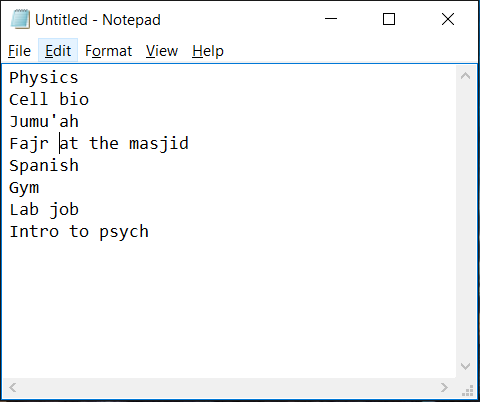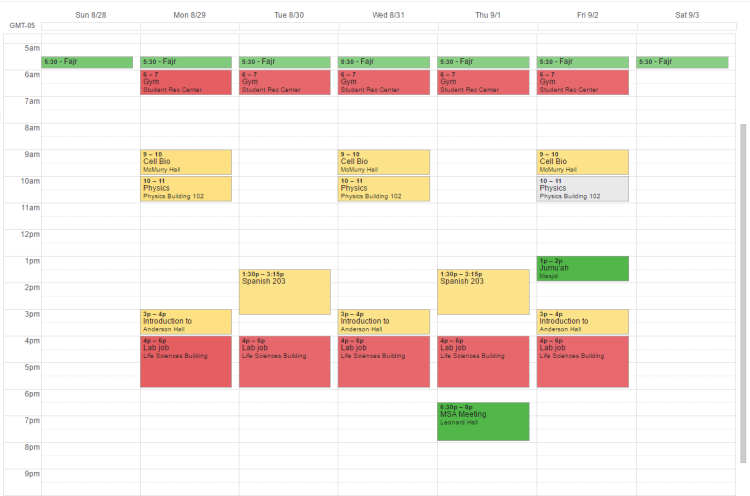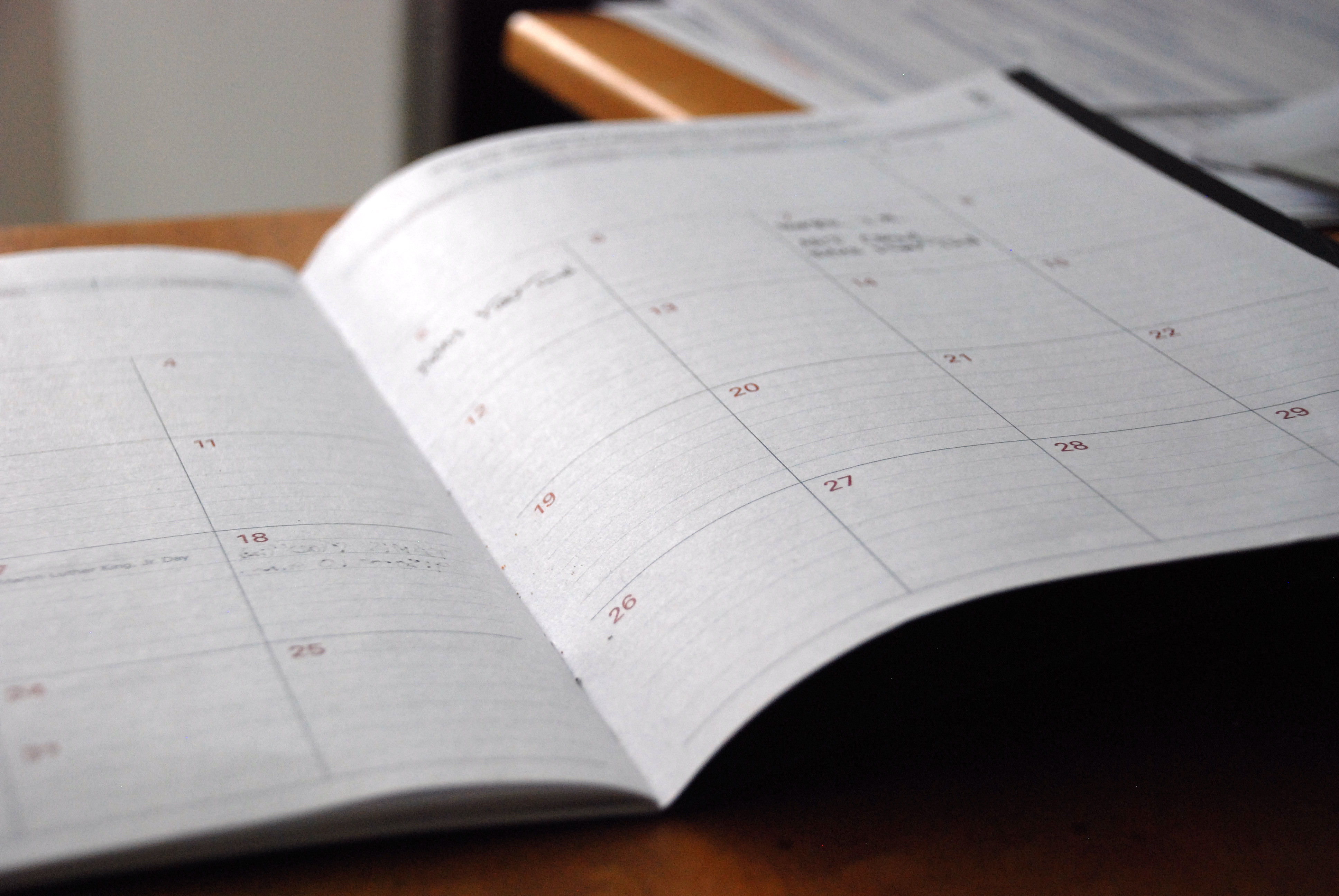In high school, your schedule was mostly made for you. You knew what time to show up to school and what time to leave and everything in between was given to you. If you had extracurriculars, they were scheduled right after school. Then you came home, did a few things, then went to bed. Not so in college. You might have one class which meets Mondays, Wednesdays, and Friday from 9am to 10:00am with weekly recitation on Thursday from 1:00pm to 2:30pm and three exams on random dates through the semester which are held from 7:00pm to 9:00pm. On exam dates, Friday session that week is cancelled. That’s just one course. Imagine trying to remember that for five classes. And then add on any extracurricular meetings, any research responsibilities, and any interesting lectures you want to attend. Without a centralized location to store all these timings, you’re inevitably going to miss something.
Having a calendar is almost a de facto requirement if you want to be successful in the 21st century. Not only will it help you avoid missing important events, it gives you immense power in managing your life. Until I sat down and made a calendar and looked at my scheduled week, I didn’t realize how much free time I had in college. As I got busier, that same calendar helped me identify time leaks in my schedule and shuffle things around to be more productive. You get a bird’s eye view of your life with a calendar and that will help you in many ways.
Pick a calendaring tool
The first thing you want to do is to pick your calendar tool. I’m sure there are tons of options out there but realistically, you’ll pick either Google Calendar or iCal. I had a Macbook Pro in college so I chose iCal. I’ve been using a Windows laptop since graduating college and use Google Calendar now. If you have a Mac, I would recommend sticking with iCal as I found it superior. Regardless, choose one and set aside a good hour or two to create your initial calendar.
Write (or type) out your weekly schedule
Think through what events you need to do every week and write it down. Don’t worry about order or scheduling or anything. Just write it out in a list. This is everything you do on a weekly or daily basis that requires you to physically be somewhere. It might look like this:

Schedule in repeating activities
Now you put these activities into your calendar. I find it useful to break things down by category and color code them. So, for example, orange for classes, green for Islamic activities, and yellow for extracurriculars.
Schedule in special events:
Go through each course syllabus and look for events that are non-repeating. This could be guest lectures outside of normal class time, evening exams, etc. Schedule those in. If you have any club meetings or other non-repeating activities, schedule those in now as well.
Color code critical events
Pick a color which stands out and use it for exams. I would color all exams black so that I would immediately see them when flipping through my calendar. If you give khutbahs, color jumu’ah those days black as well.
Here’s a sample of how it might look (made on Google Calendar. Not as aesthetically pleasing as iCal):

Set reminders
You can set notifications and email alerts to yourself. I wouldn’t set them up for normal classes; you’ll get into a routine within a few days and have no trouble remembering your schedule. What I would do when I was in college is set up an email reminder a week before any exam and thirty minutes before any special events. This way, I was never surprised by an exam and didn’t miss an event outside my normal scheduled routine.
Sync to your devices
By this point, you should more or less have your schedule made. As other events come up, you can schedule them accordingly. Make sure your calendar is synced to your phone. If you don’t know how to, Google “Sync [calendar tool] to [your phone’s OS].” This is important because while you almost always will have your phone with you, you probably will not have your computer open all the time. Whenever you need to know if you’re free at a certain time, quickly open up your calendar app and you have your entire schedule at your fingertips.
Bonus: Create tasks
Both Google Calendar and iCal have the option to create tasks. I used to use this all the time when I had iCal, have been using it much less so since I started using Google Calendar. This is basically a to-do list which you can check off as you complete tasks. I found it useful when I had iCal to keep my to-do list with my calendar on the desktop. On Google Calendar, I don’t have it sitting open on my computer 24/7 so I’ve switched to simple desktop sticky notes as my to-do list.
Insha’Allah this will help you avoid ever missing an event. If you’ve made your schedule and realize you have absolutely nothing other than your classes scheduled, don’t worry! In the next installment, I’ll talk about what other activities you should be getting involved in during college so that you maximize your time there.
Full series:
The Muslim Man’s Guide to College Part I: Get in the right mindset
The Muslim Man’s Guide to College Part II: Testing out
The Muslim Man’s Guide to College Part III: Choosing a college
The Muslim Man’s Guide to College Part IV: Choosing a major
The Muslim Man’s Guide to College Part V: Mapping your journey
The Muslim Man’s Guide to College Part VI: Creating a calendar
The Muslim Man’s Guide to College Part VII: Going beyond the classroom
The Muslim Man’s Guide to College Part VIII: How to study
The Muslim Man’s Guide to College Part IX: Dealing with failure
The Muslim Man’s Guide to College Part X: To MSA or not to MSA?


I find mystudylife.com very helpful – but it is lacking in extracurricular things for now.